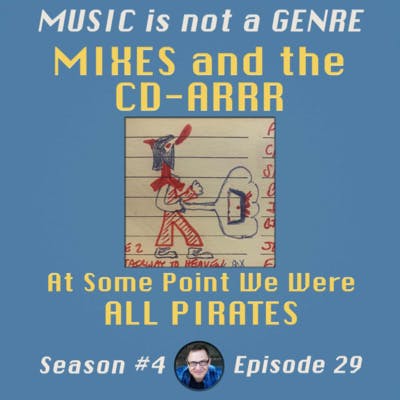MIXES and the CD-ARRR: At Some Point We Were ALL PIRATES | MUSIC is not a GENRE - Season 4 Episode #29

SUPPORT ME ON PATREON\n\nWATCH MUSIC is not a GENRE VIDEOS and MORE\n\nFEATURED SONG: REC \u2013 \u201cGold\u201d (from Parts and Labour)\n\nWhat I\u2019m about to discuss is highly illegal. Some of it. Maybe. Among other things, it\u2019s a primer on what music piracy is & isn\u2019t, and who the real pirates are. But before that, let me tell you why I\u2019m getting into this.\n\nAs I\u2019ve said a dozen or more times, I\u2019ve been a DJ since I was a teen. I started making mixes by bouncing songs from one cassette player to another. Then I used a mixing board & two turntables to record my mixes with crossfades & other fun punch-ins \u2013 again on cassette. I took it live in high school & college. After that, I\u2019d create a mix for our annual Halloween party, and a mega mix every two years. Plus a BUNCH of specialty mixes for friends, lovers & other occasions.\n\nThere were several technological developments that converged to change everything.\n\n\xb7 The internet. Sure, it\u2019s actually been around for like 50 years, but most of us know it really took hold in the early-mid 1990s \u2013 the days of the AOL disc.\n\n\xb7 The CD-R (or CD-RW). Introduced in the late 1980s, the tech became affordable about a decade later. That allowed me to record a higher quality live mix than on cassette, using the best songs from two years of my purchases.\n\n\xb7 The mp3 (and wav). Again, look to the late 1980s for this innovation, and the 1990s for its wider dissemination. What you might recall is that computers & the internet were too slow & weak to handle lots of higher quality files (like wavs), which is why the mp3 was so important. Especially when it came to\u2026\n\n\xb7 File sharing. Documents & other very small files have been shared over the internet since the 1970s, but again it was the 1990s when this took hold. And it was the early-mid 2000s when it blew sky high \u2013 in more ways than one. Remember Napster? MP3.com? LimeWire & FrostWire? Kazaa? The BitTorrent protocol?\n\nOnce all those came together, I was like a diabetic in a candy store, gobbling up everything I could get my hands on even if it was ultimately a bad idea. Yep, like most of us, I was a music pirate and happy to be one. I created several collections of music that I\u2019d never have been able to afford otherwise, and loved every minute. Fun as hell and incredibly educational, but again, a bad thing to do.\n\nBut was it? Yes and no \u2013 and that \u201cno\u201d is qualified by what came after. Music piracy didn\u2019t die because it was outlawed. (In fact, it\u2019s alive and well with things like free online software that lets you rip songs from YouTube.) It died because music & tech companies got wise. They saw an opportunity to cash in in a big way. They made it hella easier to acquire nearly unlimited music legally \u2013 first with Rhapsody/Listen, then iTunes, then everything else we know and lo- \u2026 tolerate.\n\nNow things are better for everyone, right? Wrong. These companies have made music consumption super convenient, improving the experience for both the listener & the companies themselves. But make no mistake: the music creators themselves are still being pirated.\n\nFor the FULL TEXT AND MORE visit the NEW MUSIC is not a GENRE home at: https://www.nickdematteo.com/podcast\n\n\n--- \n\nThis episode is sponsored by \n\xb7 Anchor: The easiest way to make a podcast. https://anchor.fm/app\n\nSupport this podcast: https://anchor.fm/musicisnotagenre/support\nLearn more about your ad choices. Visit megaphone.fm/adchoices